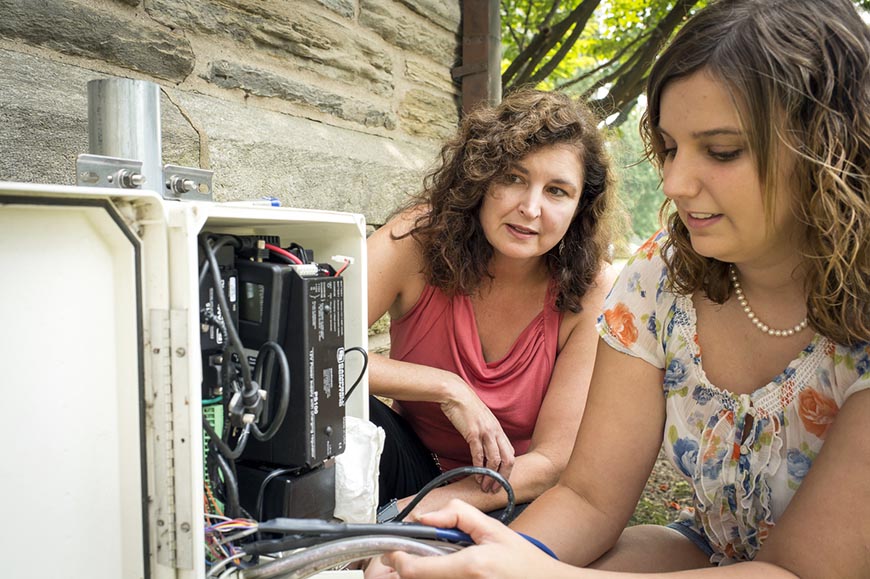Delaware River Watershed Initiative Builds on Conservation Successes

Dr. Andrea Welker, Associate Dean, Academic Affairs, and Professor of Civil and Environmental Engineering, is leading the University’s contributions to the Delaware River Watershed Initiative.
Villanova Urban Stormwater Partnership leading new wave of progress for clean water protection
Villanova University, through the Villanova Urban Stormwater Partnership, is leading a major project to protect clean water in the suburban Philadelphia region as a member of the Delaware River Watershed Initiative (DRWI).
The William Penn Foundation announced more than $40 million in new funding for the DRWI, which is among the country’s largest non-governmental conservation efforts to protect and restore clean water. The DRWI is a first-of-its-kind collaboration involving 65 non-governmental organizations working together to protect and restore the Delaware River and its tributaries, which provide drinking water for 15 million people in Pennsylvania, New York, New Jersey and Delaware.
The DRWI’s bottom-up approach represents a strategic path forward for the Delaware River basin. It is a nationally significant model that demonstrates the power of an organized, independent, non-profit-driven approach that encourages partnership between communities and the philanthropic sector.
The Upstream Suburban Philadelphia cluster, of which Villanova is a part, has built $4.7 million of new stormwater control measures at a dozen sites across the five cluster watersheds. The project’s primary investigator, Andrea Welker, PhD, PE, and her team of graduate and undergraduate students, are intensively monitoring and modeling three of these stormwater improvement sites. This continued collaboration will support the modeling and monitoring of new sites and further research into the long-term performance of stormwater control measures. “I’m incredibly excited to continue working with our cluster partners to improve water quality in the Delaware River watershed,” said Dr. Welker. “Our work is holistic in that we are not only performing sound research, we are working with watershed groups to encourage community engagement by informing them of our work.”
At its 2014 launch, the DRWI catalyzed local and regional groups to accelerate conservation efforts. The DRWI stands out as a basin-scale program driven by non-profits and guided by science. In just over three years DRWI partners have strategically initiated projects that will protect 19,604 acres and restore an additional 8,331 acres, and monitored and sampled water quality at more than 500 sites across four states.
This additional $42 million, three-year investment builds on initial successes to protect and restore an estimated 43,484 additional acres and continue science-driven, data-informed efforts to secure clean, abundant water in the basin. The Initiative provides a replicable model that can be used to improve water health across the country.
Threats to the Delaware River basin are significant, demanding a concerted response from private landowners and local officials to protect our natural resources. The DRWI is tackling widespread pollution sources that harm clean water in our rivers and streams: erosion and runoff from deforested acres in headwaters; polluted runoff from agricultural fields; flooding and polluted stormwater from cities and suburbs; and a depleted aquifer in southern New Jersey. These growing problems will threaten drinking water for millions of people every day if left unaddressed.
“By design, the Delaware River Watershed Initiative aligns the work of 65 organizations in the watershed to accelerate conservation,” said Andrew Johnson, program director for Watershed Protection at the William Penn Foundation. “The Initiative is rooted in the strength of these organizations individually and in their ability to collaborate using science to target the most important places for conservation. Together they are protecting and restoring those places, measuring the impact of their efforts on local streams, and learning collectively to improve their work.”
